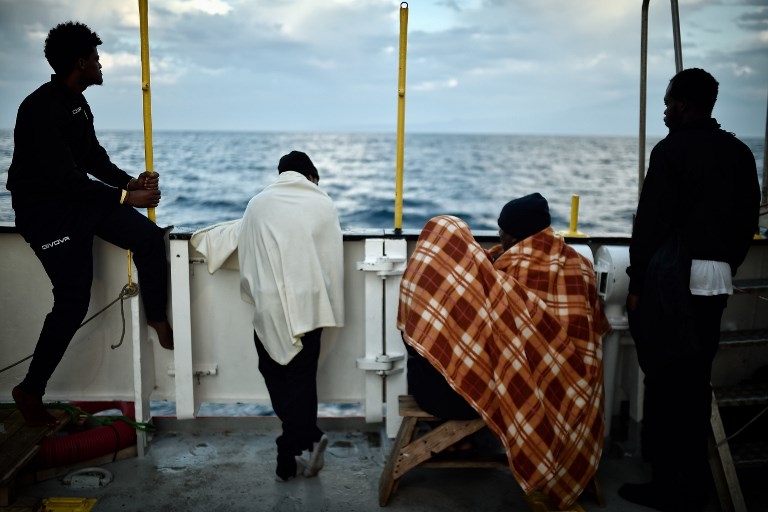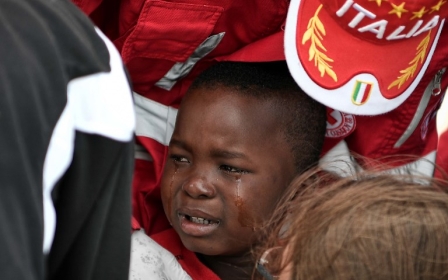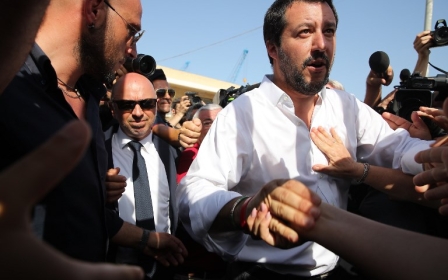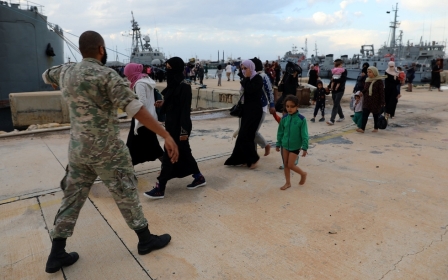Spain to take in 629 migrants stranded on Mediterranean rescue ship

Spain has announced that it will take in more than 600 migrants stranded at sea on a rescue ship, after Italy and Malta's governments refused to allow the vessel to dock on their shores.
The Aquarius rescued 629 people from the central Mediterranean Sea during six separate night-time operations on Saturday following instructions by the Italian Maritime Rescue Coordination Centre (IMRCC).
More than 100 children, several pregnant women, and a number of individuals in dire medical condition are currently on board, said Doctors Without Borders (MSF), one of the organisations in charge of the ship.
However, the Aquarius had found itself in the middle of an international dispute, as both Malta and Italy have rejected responsibility for the migrants on board the ship, refusing to let them disembark.
European Union rules mean migrants must apply for asylum in the European country where they first arrive, putting pressure on Italy and Greece, the entry points for hundreds of thousands of people fleeing war and poverty in the Middle East, Africa and Asia since 2015.
The Aquarius first headed to Italy, which refused to admit the ship, saying the vessel passed Malta, therefore it was the island nation's responsibility.
Italy's far-right interior minister, Matteo Salvini, in a joint statement with Danilo Toninelli, the minister in charge of the Italian coastguard, insisted that Malta "cannot continue to look the other way when it comes to respecting precise international conventions on the protection of human life".
Malta's government replied, saying its prime minister, Joseph Muscat, had spoken to the Italian premier, Giuseppe Conte, and underlined "that Malta is acting in full conformity with its international obligations".
"As such, Malta will not take the said vessel in its ports," it said in a statement.
Salvini, who was only recently appointed as Italy’s deputy prime minister and interior minister, has taken a hard-line approach against migrants, stating that his country would clamp down on new arrivals.
"The good times for illegals [are] over,” Salvini said earlier this month.
In the meantime, SOS Mediterranee, another organisation on the Aquarius, tweeted late on Sunday that the ship had "received instructions from the Italian Maritime Rescue Coordination Centre to standby in our current position, which is 35 nautical miles from Italy and 27 nautical miles from Malta".
The instructions were still standing as of early Monday afternoon, until Spanish Prime Minister Pedro Sanchez, who took office just over a week ago, gave instructions for the boat to be admitted to the eastern port of Valencia, his office said in a statement.
The UN refugee agency had called on Italy and Malta on Monday to immediately allow the Aquarius to dock, describing the situation as "an urgent humanitarian imperative" as the people on board were "running out of provisions”.
“Broader issues such as who has responsibility and how these responsibilities can best be shared between states should be looked at later,” the agency added.
The EU had also urged on Italy and Malta to reach a "swift resolution" to the crisis.
"We call on all involved to contribute to a swift resolution so that the people on board the Aquarius vessel may be safely disembarked as soon as possible," European Commission spokesman Margaritis Schinas told a daily briefing.
EU leaders in December had set an end of June deadline for an overhaul of rules to create a permanent mechanism to deal with migrants in the event of a new emergency.
The summer of 2016 saw a surge in mass drownings in the Mediterranean, as Europe's worst migration crisis since the Second World War peaked with hundreds of thousands of people fleeing war and poverty in the Middle East and elsewhere.
The United Nations estimates that at least 500 people have died in 2018 trying to cross the central Mediterranean, after 2,853 fatalities last year.
New MEE newsletter: Jerusalem Dispatch
Sign up to get the latest insights and analysis on Israel-Palestine, alongside Turkey Unpacked and other MEE newsletters
Middle East Eye delivers independent and unrivalled coverage and analysis of the Middle East, North Africa and beyond. To learn more about republishing this content and the associated fees, please fill out this form. More about MEE can be found here.




